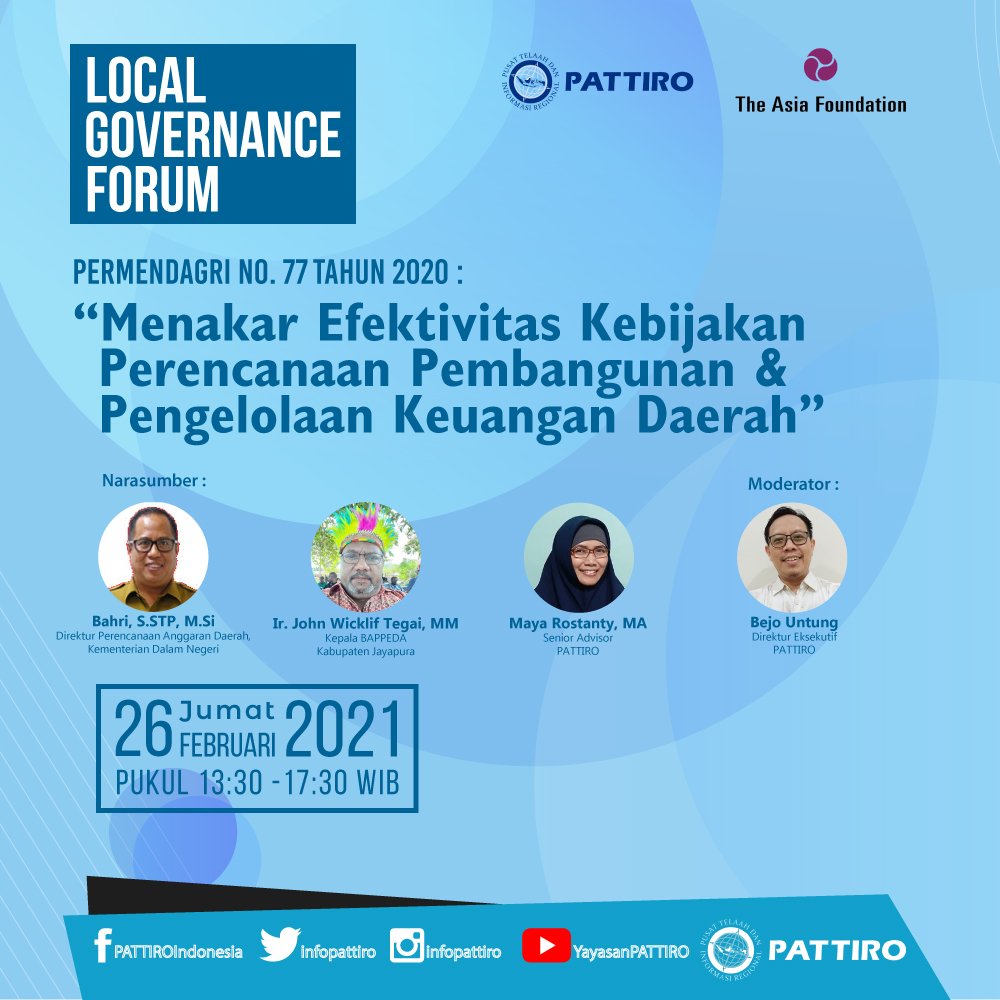 Government assistance regarding the implementation of regulations is considered to be an important factor in encouraging the effectiveness of development planning policies and regional financial management. This was raised at the PATTIRO Local Governance Forum on Friday, February 26, 2021 with the theme “Measuring the Effectiveness of Regional Development Planning and Financial Management Policies” which invited various local governments in Indonesia.
Government assistance regarding the implementation of regulations is considered to be an important factor in encouraging the effectiveness of development planning policies and regional financial management. This was raised at the PATTIRO Local Governance Forum on Friday, February 26, 2021 with the theme “Measuring the Effectiveness of Regional Development Planning and Financial Management Policies” which invited various local governments in Indonesia.
PATTIRO Program Manager Ramlan Nugraha said that in recent years the government has issued regulations regarding development planning and regional financial management. These regulations include Government Regulation (PP) No. 12/2019, Minister of Home Affairs Regulation (Permendagri) No. 70/2019, Permendagri No. 90/2019, and Permendagri No. 64/2020. In their implementation, the existing regulations have encountered several obstacles both in terms of planning and implementation. For example, the results of updating the nomenclature of development planning in Permendagri No. 90/2019 in conjunction with the Decree of the Minister of Home Affairs (Kepmendagri) No. 50/2020 has not accommodated regional strategic programs.
Ramlan also explained several critical notes on the implementation of regulations that have been running, among others, first, Permendagri No. 90/2019 limits the space for regional innovation in formulating programs and activities. Second, reduction of community participation in the development planning process (Musrenbang) because programs, activities and sub-activities have been determined by the government. Third, the function of legislation in PP no. 12/2019 seems to be ‘weakened’ in development planning. Fourth, regulations regarding development planning and regional financial management do not yet support information disclosure.
The Head of Bappeda of Jayapura Regency John Wicklif Tegai also conveyed a similar observation. He revealed that the various regulations issued by the government are often not accompanied by adequate socialization to the regions. This results in much time taken to make adjustments to the new regulations. In addition, short and intense regulatory changes have an impact on the performance of local governments in planning, budgeting and managing regional finances. According to John, the impact is that there are regional programs and activities that have not been included in the regional planning nomenclature as regulated in Kepmendagri No. 50/2020.
Responding to this, M. Ihsan from the Directorate of Regional Budget Planning at the Ministry of Home Affairs said that the current policy direction is towards simplification, for example, Permendagri No. 70/2019 and Permendagri No. 90/2019, which regulate local government information systems and budget planning nomenclature. However, the existing system still needs to be developed and supported for its implementation down to the regional level to support its effectiveness. According to him, with the issuance of Permendagri No. 77/2020 concerning Technical Guidelines for Regional Financial Management, one of the supports that the regions need to do is to further detail the financial management rules into Regional Regulations such as regional financial management, regional procedures, regional financial accounting, and expenditure analysis. This is so that regional financial management can be carried out effectively by each local government.
The Mulawarman University academic Dr. Zulkarnain suggested that in drafting regulations, the central government should invite the regions for discussion. According to him, local governments, especially the provinces, are representatives of the central government, so they have the right to be accommodated for their needs.
At the end of the discussion, PATTIRO Senior Advisor Maya Rostanty said that it is very important to pay attention to the harmonization of regulations in policies prepared by the government. This is so that the regions are not bombarded with successive new regulations. Some things such as system readiness in the Local Government Information System (SIPD) need to be well prepared. In addition, existing human resources must also be able to implement regulations so that the smooth running of public services to the community is not hindered. The implementation of regulations related to development planning and regional financial management requires adequate support from the central government.





